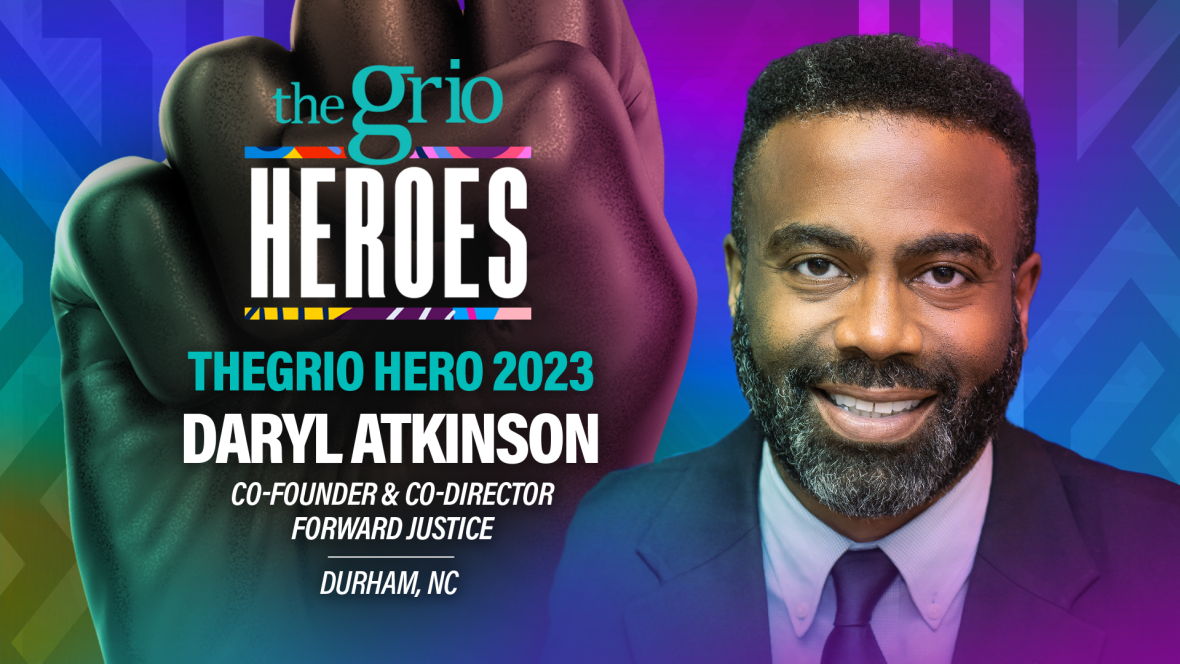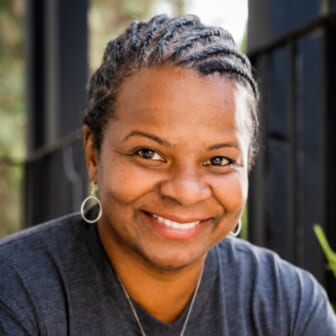Meet Daryl Atkinson, theGrio Hero for 2023!
Atkinson, co-founder and co-director of Forward Justice, is fighting to give currently and formerly incarcerated people a second chance. He is the winner of the inaugural theGrio Heroes as voted by our readers.
In 1999, Daryl Atkinson walked out of the St. Clair Correctional Facility in Springville, Ala., and stepped into his purpose. His mission for nearly two decades? To help the currently and formerly incarcerated start over and provide a brighter future.
“I left hundreds of brilliant men behind after my incarceration, and the only thing that separated me from them was access to opportunity,” said Atkinson, 52, who spent over three years in prison for a nonviolent drug crime — his first-time offense. “I’ve devoted my career to trying to create those various access points to the same opportunities.”

The attorney and community activist, now living in North Carolina, has fought to provide the most marginalized with second chances, reducing recidivism, securing rights and restoring the overall humanity of those leaving prison. In 2016, he co-founded and currently co-directs Forward Justice, a nonprofit that works toward achieving racial, economic and social justice for those currently and formerly incarcerated.
Working in partnership with like-minded organizations in the South, Atkinson and Forward Justice have led movements building litigation and advanced public policies addressing the rights of those with criminal records. That includes the 2020 passage of the Second Chance Act, a landmark North Carolina law that makes the expungement process easier to give formerly incarcerated people equal access to opportunities for housing, education and employment.
Over the last four years, he served as lead attorney in a monumental case in the state seeking to reinstate voting rights for more than 55,000 North Carolinians previously convicted of felonies. “We’re fighting to achieve a third reconstruction in this country,” Atkinson said.
This mission spoke to theGrio readers, who voted Daryl Atkinson as our inaugural theGrio Hero. We created this initiative to recognize everyday Black Americans, the unsung heroes who are dedicated to improving the Black community and uplifting the culture. In the first year, Atkinson was among a strong contingent of finalists.
“I don’t think of myself as special or exceptional,” he said.
Atkinson credited two “jailhouse lawyers” with offering him an alternative and purpose-driven vision for his life while in prison, and his family with helping him to get his footing upon his release. That’s even though he was assessed a $50,000 fine when he was released, which he just finished paying off last year. He was also denied federal financial aid for college, his driver’s license was suspended and he lost his voting rights in his home state of Alabama — all of which served as barriers to rebuilding.
“But I didn’t have those pressures of finding food, shelter and clothing — those Maslowian needs to survive,” he said. “As a result, I could think and could work out a plan for his future. That’s essential for people’s success returning home.”
In 2004, Atkinson earned his bachelors from Benedict College in Columbia, S.C., and he went on to receive his law degree in 2007 from the University of St. Thomas in Minneapolis. In 2015, he was tapped to be the first-ever Second Chance Fellow for the Department of Justice during the Obama administration, a position that allowed him the opportunity to help create an experimental site reinstating the Pell Grant for incarcerated people.
He’s a founding member of the North Carolina Second Chance Alliance, a collaborative of people who support the reintegration of adults and juveniles after incarceration. And he’s on the board of directors for the Clean Slate Initiative.
During the pandemic, Atkinson joined forces with a legal team to sue the governor and department of public safety for violating the constitutional rights of the thousands in state prisons and jails who’re most vulnerable to the spread of the virus. The suit asserted that the state had a legal obligation to protect incarcerated people, prison staff and surrounding communities from a potential large-scale outbreak. The historic settlement resulted in the early release of over 3,500 people most vulnerable to the virus.
For Atkinson, all of these deeds come from tapping into deep family roots of community activism. He noted how his maternal grandparents spearheaded a community group that supported Charles Gomillion, a Tuskegee University professor who fought and won a 1960 lawsuit outlawing racially motivated gerrymandering in Tuskegee.
“Resistance is in my DNA,” Atkinson said. “My path got diverted but all of that has been re-emerged.”

Monée Fields-White is an award-winning writer and journalist based in Los Angeles. She has produced a broad spectrum of stories on a national and global scale for leading publications and nonprofit organizations in the four largest markets—Washington, D.C., New York, Chicago and Los Angeles. She can be found on Twitter and LinkedIn.
TheGrio is FREE on your TV via Apple TV, Amazon Fire, Roku, and Android TV. Please download theGrio mobile apps today!
